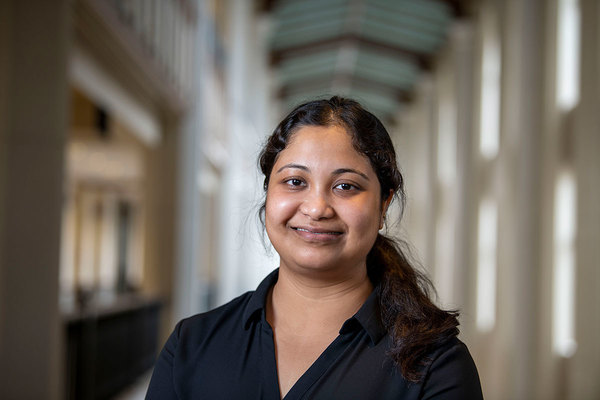
Nirupama Sensharma, who plans to graduate in 2021 with her doctoral degree in physics from the University of Notre Dame, is passionate about nuclear science and wants to make sure the public understands the benefits of deriving energy from nuclear power.
Her message: Be not afraid.
Her new startup, thebetterenergy.net, aims to dispel myths about nuclear energy to prevent undue resistance from residents when a company wants to build a new reactor that will provide electricity.

“In the United States, specifically, getting electricity from nuclear power is very expensive and has a huge capital cost,” she said. “It would take less time if we were able to get people to understand more about nuclear power, and then more would be willing to invest in these programs.”
Sensharma, who became interested in nuclear energy during graduate school in India, is a doctoral student in the laboratory of Professor Umesh Garg in the Department of Physics, and has already published research as the first author on a well-received paper about nuclear wobbling in an isotope of gold. Before she started her company, she participated in a program through the John J. Reilly Center called “Social Responsibility for Researchers,” which planted the seed for her idea to develop a website and business centered on awareness of nuclear power. The program, which lasts for a year and a half, allows participants to learn about the broad social and political context of their work.
“I can say with confidence that, while there were many excellent projects, hers will endure and the most effective and impactful of the roughly 40 projects that were produced over the three years of the program,” said Don Howard, professor of philosophy.
The project progressed from there, and she created a team to promote nuclear energy. They reached out to middle and high schools, and collaborated with ND Energy. Sensharma enjoyed the process so much that she decided to take it a step further, and became involved with The IDEA Center to learn more about how a business is run.
“A lot of websites about nuclear energy are either too technical, or they do not give reliable information,” she said. “Our website is targeted to people who do not have a science background and is meant to be easily understood by everyone.”
Sensharma writes some of the articles and shares ones that others write, and also sends a newsletter to subscribers. She hopes to gain collaborators, which may consist of businesses who want to educate residents about nuclear power. Recently the company published the first issue of a bimonthly magazine, and has acquired a following on Facebook and LinkedIn.
Her business now consists of six members—four graduate students, one undergraduate and two international collaborators. The website is targeted for a general audience and designed to be interactive.
India, where Sensharma has worked in some nuclear power plants, derives four percent of its electricity from nuclear power, she said, and has problems with people being afraid of nuclear power. “They were scared, thinking it was something strange and mysterious,” she said.
Myths abound, spread by misinformation. For instance, Sensharma said, many think that people in Fukushima, Japan, died in 2011 because of the Fukushima Daiichi nuclear reactor accident, but residents were killed because of the earthquake and resulting tsunami. Only one death, from cancer, has been attributed to the nuclear accident.
But Sensharma believes thebetterenergy.net—along with future merchandise and even future competitions—may be the first step in rewriting the narrative that surrounds nuclear power.
“An educated public needs accessible, accurate, and honestly brokered information in order to make good decisions about important questions of policy. Organizations like the Department of Energy and the International Atomic Energy Agency provide a lot of excellent technical information about nuclear power,” Howard said. “But what Nirupama's web site aims to do is to make such information accessible to the general public, empowering ordinary people to distinguish facts from propaganda."
Originally published by at "science.nd.edu":https://science.nd.edu/news/physics-doctoral-student-champions-nuclear-energy-through-startup-company/ on June 15, 2020.